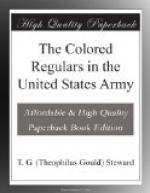Let us now sum up the qualifications that these people possessed in large degree, in order to determine their fitness for freedom, then so near at hand. They had acquired the English language, and the Christian religion, including the Christian idea of marriage, so entirely different in spirit and form from the African marriage. They had acquired the civilized methods of cooking their food, making and wearing clothes, sleeping in beds, and observing Sunday. They had acquired many of the useful arts and trades of civilization and had imbibed the tastes and feelings, to some extent, at least, of the country in which they lived. Becoming keen observers, shut out from books and newspapers, they listened attentively, learned more of law and politics than was generally supposed. They knew what the election of 1860 meant and were on tiptoe with expectation. Although the days of insurrection had passed and the slave of ’59 was not ready to rise with the immortal John Brown, he had not lost his desire for freedom. The steady march of escaping slaves guided by the North star, with the refrain:
“I’m on my way
to Canada,
That cold but
happy land;
The dire effects of slavery
I can no longer
stand,”
proved that the desire to be free was becoming more extensive and absorbing as the slave advanced in intelligence.
It is necessary again to emphasize the fact that the American slaves were well formed and well developed physically, capable of enduring hard labor and of subsisting upon the plainest food. Their diet for years had been of the simplest sort, and they had been subjected to a system of regulations very much like those which are employed in the management of armies. They had an hour to go to bed and an hour to rise; left their homes only upon written “passes,” and when abroad at night were often halted by the wandering patrol. “Run, nigger, run, the patrol get you,” was a song of the slave children of South Carolina.




